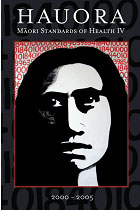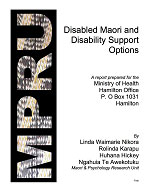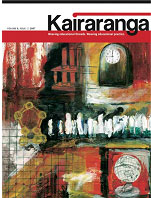“Today Michael’s Mum came and her name is Bernie and we were talking about Michael to see how we could help him. We can play games with him and show him things to do with people and to respect Michael and teach him and we could have a running game or show him how to jump the tyres and Michael’s Mum brought some lamps to show us how they work and one was a touch lamp” (Wastney, Te Kooro-Baker & McPeak, 2007, p.18).

Keri Ratima and Mihi Ratima wrote about Māori experiences of disability and disability support services in the 2007 edition of Hauora: Māori standards of health IV. Their chapter examines Māori understandings of disability and disability support services before they explore the data on impairment issues among Māori and the evolution of disability support services. They conclude that positive changes can and should be made.
Immediate steps can be taken to enable the collection of accurate ethnicity data, to provide a clear picture of the state of Māori impairment and disability that is required to conduct strategic planning around the needs of Māori. Strengthening the Māori disability workforce, funding of research focused on disabled Māori and their whānau… and factoring into funding formulas the additional costs of culturally responsive disability support services, are all necessary precursors to a responsive disability sector. (p.196-197).

In 2004 researchers at the Māori & Psychology Research Unit, University of Waikato (Linda Nikora, Rolinda Karapu, Huhana Hickey & Ngahuia Te Awekotuku) reported on disabled Māori and disability support options. The researchers documented the needs of disabled Māori and their carers, and proposed a model of disability support services provision.
Their report explores different models of disability (e.g., the medical model, the tragedy/charity model) before looking at Māori views of disability. Barriers to accessing disability services, including cultural barriers, are then described. The analysis of the views of Māori with disabilities “concludes strategically with a view of an ideal community” (p.v). Key informants/whānau carers give voice to an unrecognised side of disability.

Bernie Wastney, Gayle Te Kooro-Baker and Carolyn McPeak wrote about facilitating acceptance and understanding of autism in a 2007 issue of Kairaranga. As described in the abstract,
This article contains the transcript of a session one mother ran in her child’s class. The aim of the session was to give class members a better understanding of autism spectrum disorders (ASD) in general and of her son in particular. The effectiveness of her approach is evident in the follow-up stories children wrote and in the experiences this mother recounts. Included as an appendix is a questionnaire developed by three Māori parents of children with ASD. These questions were used to assist them in selecting schools to meet their children’s special and cultural needs.
